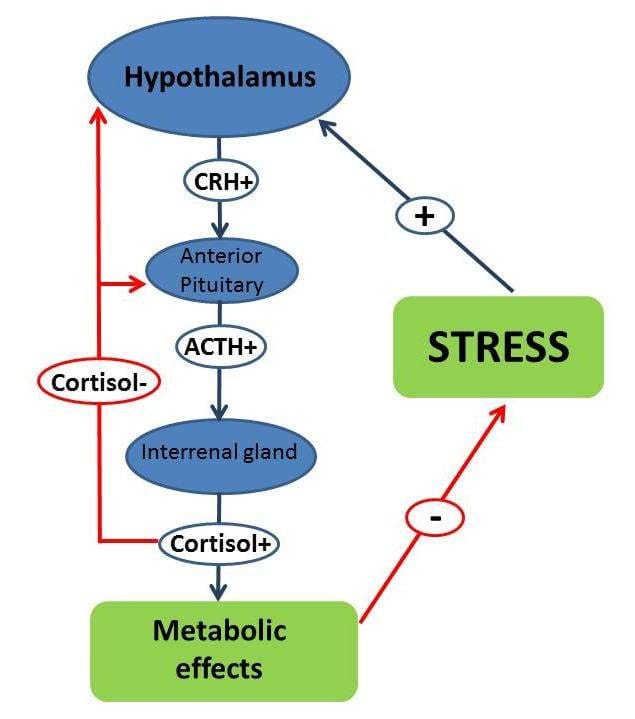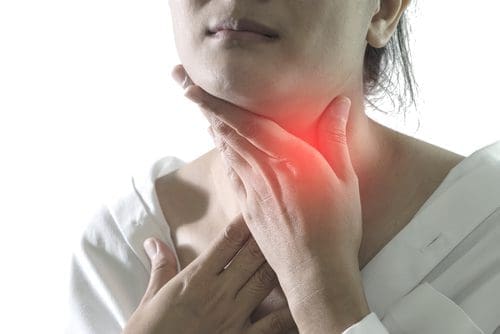The thyroid is a small, butterfly-shaped gland that is located in the anterior neck producing T3 (triiodothyronine) and T4 (tetraiodothyronine) hormones. These hormones affect every single tissue and regulate the body’s metabolism while being part of an intricate network called the endocrine system. The endocrine system is responsible for coordinating many of the body’s activities. In the human body, the two major endocrine glands are the thyroid glands and the adrenal glands. The thyroid is controlled primarily by TSH (thyroid-stimulating hormone), which is secreted from the anterior pituitary gland in the brain. The anterior pituitary gland can stimulate or halt the secretion to the thyroid, which is a response only gland in the body.
Since the thyroid glands make T3 and T4, iodine can also help with the thyroid hormone production. The thyroid glands are the only ones that can absorb the iodine to help hormone growth. Without it, there can be complications like hyperthyroidism, hypothyroidism, and Hashimoto’s disease.
Table of Contents
Thyroid Influences on The Body Systems
The thyroid can help metabolize the body, such as regulating heart rate, body temperature, blood pressure, and brain function. Many of the body’s cells have thyroid receptors that the thyroid hormones respond to. Here are the body systems that the thyroid helps out.
Cardiovascular System and the Thyroid
Under normal circumstances, the thyroid hormones help increase the blood flow, cardiac output, and heart rate in the cardiovascular system. The thyroid can influence the heart’s “excitement,” causing it to have an increasing demand for oxygen, therefore increasing the metabolites. When an individual is exercising; their energy, their metabolism, as well as their overall health, feels good.

The thyroid actually strengthens the heart muscle, while decreasing the external pressure because it relaxes the vascular smooth muscle. This results in a decrease of arterial resistance and diastolic blood pressure in the cardiovascular system.
When there is an excess amount of thyroid hormone, it can increase the heart’s pulse pressure. Not only that, the heart rate is highly sensitive to an increase or decrease in the thyroid hormones. There are a few related cardiovascular conditions listed below that can be the result of an increased or decreased thyroid hormone.
- Metabolic Syndrome
- Hypertension
- Hypotension
- Anemia
- Arteriosclerosis
Interestingly, iron deficiency can slow the thyroid hormones as well as increase the production of the hormones causing problems in the cardiovascular system.
The Gastrointestinal System and the Thyroid
The thyroid helps the GI system by stimulating carbohydrate metabolism and fat metabolism. This means that there will be an increase in glucose, glycolysis, and gluconeogenesis as well as an increased absorption from the GI tract along with an increase in insulin secretion. This is done with an increased enzyme production from the thyroid hormone, acting on the nucleus of our cells.

The thyroid can increase the basal metabolic rate by helping it increase the speed of breaking down, absorbing, and the assimilation of the nutrients we eat and eliminate waste. The thyroid hormone can also increase the need for vitamins for the body. If the thyroid is going to regulate our cell metabolism, there has to be an increased need for vitamin cofactors because the body needs the vitamins to make it function properly.
Some conditions can be impacted by thyroid function, and coincidentally can cause thyroid dysfunction.
- Abnormal cholesterol metabolism
- Overweight/underweight
- Vitamin deficiency
- Constipation/diarrhea
Sex Hormones and the Thyroid

The thyroid hormones have a direct impact on ovaries and an indirect impact on SHBG (sex hormone-binding globulin), prolactin, and gonadotropin-releasing hormone secretion. Women are dramatically more affected by thyroid conditions than men due to hormones and pregnancy. There is also another contributing factor that women share, their iodine vitals and their thyroid hormones through the ovaries and the breast tissue in their bodies. The thyroid can even have either a cause or contribution to pregnancy conditions like:
- Precocious puberty
- Menstrual issues
- Fertility issues
- Abnormal hormone levels
HPA Axis and the Thyroid
The HPA axis (Hypothalamic-Pituitary-Adrenal Axis) modulates the stress response in the body. When that happens, the hypothalamus releases the corticotropin-releasing hormone, it triggers the ACH (acetylcholine hormone) and the ACTH (adrenocorticotropic hormone) to act on the adrenal gland to release cortisol. Cortisol is a stress hormone that can lower inflammation and increase carbohydrate metabolism in the body. It can also trigger a cascade of “alarm chemicals” like epinephrine and norepinephrine (fight or flight response). If there is an absence of lowered cortisol, then the body will desensitize for the cortisol and the stress response, which is a good thing.

When there is a higher level of cortisol in the body, it will decrease the thyroid function by lowering the conversion of the T4 hormone to T3 hormone by impairing the deiodinase enzymes. When this happens, the body will have a less functional thyroid hormone concentration, since the body can’t tell the difference of a hectic day at work or running away from something scary, it can either be very good or horrible.
Thyroid Problems in the Body
The thyroid can produce either too much or not enough hormones in the body, causing health problems. Down below are the most commonly known thyroid problems that will affect the thyroid in the body.
- Hyperthyroidism: This is when the thyroid is overactive, producing an excessive amount of hormones. It affects about 1% of women, but it’s less common for men to have it. It can lead to symptoms such as restlessness, bulging eyes, muscle weakness, thin skin, and anxiety.
- Hypothyroidism: This is the opposite of hyperthyroidism since it can’t produce enough hormones in the body. It is often caused by Hashimoto’s disease and can lead to dry skin, fatigue, memory problems, weight gain, and a slow heart rate.
- Hashimoto’s disease: This disease is also known as chronic lymphocytic thyroiditis. It affects about 14 million Americans and can occur in middle-aged women. This disease develops when the body’s immune system mistakenly attacks and slowly destroys the thyroid gland and its ability to produce hormones. Some of the symptoms that Hashimoto’s disease causes are a pale, puffy face, fatigue, enlarged thyroid, dry skin, and depression.
Conclusion
The thyroid is a butterfly-shaped gland located in the anterior neck that produces hormones that help function the entire body. When it doesn’t work correctly, it can either create an excessive amount or decrease the number of hormones. This causes the human body to develop diseases that can be long term.
In honor of Governor Abbott’s proclamation, October is Chiropractic Health Month. To learn more about the proposal on our website.
The scope of our information is limited to chiropractic, musculoskeletal, and nervous health issues as well as functional medicine articles, topics, and discussions. We use functional health protocols to treat injuries or chronic disorders of the musculoskeletal system. To further discuss the subject matter above, please feel free to ask Dr. Alex Jimenez or contact us at 915-850-0900 .
References:
America, Vibrant. “Thyroid and Autoimmunity.” YouTube, YouTube, 29 June 2018, www.youtube.com/watch?feature=youtu.be&v=9CEqJ2P5H2M.
Clinic Staff, Mayo. “Hyperthyroidism (Overactive Thyroid).” Mayo Clinic, Mayo Foundation for Medical Education and Research, 3 Nov. 2018, www.mayoclinic.org/diseases-conditions/hyperthyroidism/symptoms-causes/syc-20373659.
Clinic Staff, Mayo. “Hypothyroidism (Underactive Thyroid).” Mayo Clinic, Mayo Foundation for Medical Education and Research, 4 Dec. 2018, www.mayoclinic.org/diseases-conditions/hypothyroidism/symptoms-causes/syc-20350284.
Danzi, S, and I Klein. “Thyroid Hormone and the Cardiovascular System.” Minerva Endocrinologica, U.S. National Library of Medicine, Sept. 2004, www.ncbi.nlm.nih.gov/pubmed/15282446.
Ebert, Ellen C. “The Thyroid and the Gut.” Journal of Clinical Gastroenterology, U.S. National Library of Medicine, July 2010, www.ncbi.nlm.nih.gov/pubmed/20351569.
Selby, C. “Sex Hormone Binding Globulin: Origin, Function and Clinical Significance.” Annals of Clinical Biochemistry, U.S. National Library of Medicine, Nov. 1990, www.ncbi.nlm.nih.gov/pubmed/2080856.
Stephens, Mary Ann C, and Gary Wand. “Stress and the HPA Axis: Role of Glucocorticoids in Alcohol Dependence.” Alcohol Research: Current Reviews, National Institute on Alcohol Abuse and Alcoholism, 2012, www.ncbi.nlm.nih.gov/pmc/articles/PMC3860380/.
Wallace, Ryan, and Tricia Kinman. “6 Common Thyroid Disorders & Problems.” Healthline, 27 July, 2017, www.healthline.com/health/common-thyroid-disorders.
Wint, Carmella, and Elizabeth Boskey. “Hashimoto’s Disease.” Healthline, 20 Sept. 2018, www.healthline.com/health/chronic-thyroiditis-hashimotos-disease.
Post Disclaimer
Professional Scope of Practice *
The information on this blog site is not intended to replace a one-on-one relationship with a qualified healthcare professional or licensed physician and is not medical advice. We encourage you to make healthcare decisions based on your research and partnership with a qualified healthcare professional.
Blog Information & Scope Discussions
Welcome to El Paso's Premier Wellness and Injury Care Clinic & Wellness Blog, where Dr. Alex Jimenez, DC, FNP-C, a board-certified Family Practice Nurse Practitioner (FNP-BC) and Chiropractor (DC), presents insights on how our team is dedicated to holistic healing and personalized care. Our practice aligns with evidence-based treatment protocols inspired by integrative medicine principles, similar to those found on this site and our family practice-based chiromed.com site, focusing on restoring health naturally for patients of all ages.
Our areas of chiropractic practice include Wellness & Nutrition, Chronic Pain, Personal Injury, Auto Accident Care, Work Injuries, Back Injury, Low Back Pain, Neck Pain, Migraine Headaches, Sports Injuries, Severe Sciatica, Scoliosis, Complex Herniated Discs, Fibromyalgia, Chronic Pain, Complex Injuries, Stress Management, Functional Medicine Treatments, and in-scope care protocols.
Our information scope is limited to chiropractic, musculoskeletal, physical medicine, wellness, contributing etiological viscerosomatic disturbances within clinical presentations, associated somato-visceral reflex clinical dynamics, subluxation complexes, sensitive health issues, and functional medicine articles, topics, and discussions.
We provide and present clinical collaboration with specialists from various disciplines. Each specialist is governed by their professional scope of practice and their jurisdiction of licensure. We use functional health & wellness protocols to treat and support care for the injuries or disorders of the musculoskeletal system.
Our videos, posts, topics, subjects, and insights cover clinical matters and issues that relate to and directly or indirectly support our clinical scope of practice.*
Our office has made a reasonable effort to provide supportive citations and has identified relevant research studies that support our posts. We provide copies of supporting research studies available to regulatory boards and the public upon request.
We understand that we cover matters that require an additional explanation of how they may assist in a particular care plan or treatment protocol; therefore, to discuss the subject matter above further, please feel free to ask Dr. Alex Jimenez, DC, APRN, FNP-BC, or contact us at 915-850-0900.
We are here to help you and your family.
Blessings
Dr. Alex Jimenez DC, MSACP, APRN, FNP-BC*, CCST, IFMCP, CFMP, ATN
email: coach@elpasofunctionalmedicine.com
Licensed as a Doctor of Chiropractic (DC) in Texas & New Mexico*
Texas DC License # TX5807
New Mexico DC License # NM-DC2182
Licensed as a Registered Nurse (RN*) in Texas & Multistate
Texas RN License # 1191402
ANCC FNP-BC: Board Certified Nurse Practitioner*
Compact Status: Multi-State License: Authorized to Practice in 40 States*
Graduate with Honors: ICHS: MSN-FNP (Family Nurse Practitioner Program)
Degree Granted. Master's in Family Practice MSN Diploma (Cum Laude)
Dr. Alex Jimenez, DC, APRN, FNP-BC*, CFMP, IFMCP, ATN, CCST
My Digital Business Card


